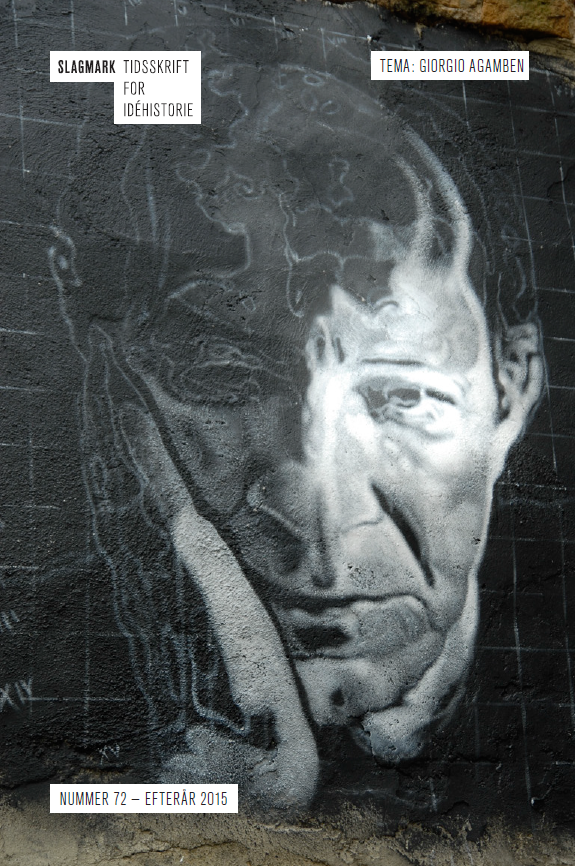Fra konstituerende magt til destituerende magt:
En kritik af Agambens konception af magt og politik
DOI:
https://doi.org/10.7146/sl.v2015i72.107204Keywords:
sovereignty, Agamben, Aristotle, constituent power, destituent powerAbstract
The Italian philosopher Giorgio Agamben’s conception and critique of sovereignty has won him wide and well-deserved acclamation. In this article, however, it is argued that Agamben’s conception of sovereignty is somewhat misplaced, and, as a consequence, his positive political project of developing a ‘destituent power’ (as opposed to constituent power) is highly deficient in terms of construing a popular and viable political alternative. The critique of Agamben is developed through a close reading of Aristotle’s Politics and his notion of kurion. It is argued that Agamben’s flawed conception of sovereignty reemerges symptomatically in his extremely problematic reading of Aristotle’s Politics, and that a viable political alternative to both Agamben’s own project and the conception of politics that he criticizes can be developed through an alternative and closer reading of Aristotle.
References
Agamben, G. (1993). The Coming Community. Minneapolis: University of Minnesota Press.
Agamben, G. (1998). Homo Sacer. Stanford: Stanford University Press.
Agamben, G. (2000). Means without End. Minneapolis: University of Minnesota Press.
Agamben, G. (2007). Profanations. New York: Zone Books.
Agamben, G. (2009). Note liminaire sur le concept de la démocratie. I Démocratie, dans quel état? Paris: La fabrique, 7-9.
Agamben, G. (2014a). For a Theory of Destituent Power. http://criticallegalthinking.com/2014/02/05/theory-destituent-power/.
Agamben, G. (2014b). What is a Destituent Power? Environment and Planning D: Society and Space, 32, s. 65– 74.
Agamben, G. (2015a [2009]). Indledende note om demokrati-begrebet. Slagmark – Tidsskrift for idéhistorie, 72, Giorgio Agamben.
Agamben, G. (2015b [2014]). Elementer til en teori om destituerende magt. Slagmark – Tidsskrift for idéhistorie, 72, Giorgio Agamben.
Aristoteles (1944). Politics (bilingual edition). London: Harvard University Press.Aristoteles (intet år). Αθηναίων πολιτεία. Athen: I. Zacharopoulos.
Badiou, A. (2010). The Communist Hypothesis. London: Verso.
Böckenförde, E.-W. (1986). Die verfassungsgebende Gewalt des Volkes. Berlin: Hermann Luchterhand Verlag.
Derrida, J. (2009). The Beast and the Sovereign. Chicago: Chicago University Press.
Finlayson, J.G. (2010). ‘Bare Life’ and Politics in Agamben’s reading of Aristotle. The Review of Politics, 72, 97-126.
Hobbes, T. (1996 [1651]). Leviathan. Oxford: Oxford University Press.
Loraux, N. (2006). The Divided City. New York: Zone Books.
Marx, K. (1970 [1867]). Kapitalen (bind 1). København: Rhodos.
Mills, C. (2004). Agamben’s messianic politics: Biopolitics, abandonment and happy life. Contretemps, 5, 42–62.
Nancy, J.-L., (1993). The Birth to Presence. Stanford: Stanford University Press.
Negri, A. (1999). Insurgencies: Constituent Power and the Modern State. Minneapolis: University of Minnesota Press.
Rancière, J. (2004). The Philosopher and his Poor. London: Duke University Press.
Schmitt, C. (1922). Politische Theologie. Berlin: Duncker & Humblot.
Sieyès, E.-J. (1789). Reconoissance et exposition raisonée des droits de l’homme et du citoyen. Paris.
von Eggers, N. (2015). Reappropriating Sovereignty: A Critique of Giorgio Agamben’s Abandonment of Sovereignty. Trópos, 8, 155-179.





